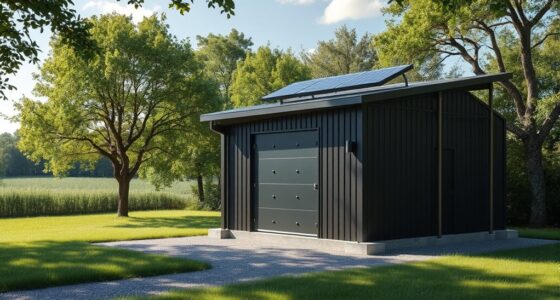Adding a pool to your home can raise your insurance premiums because it increases liability and safety risks. Larger, in-ground pools and those without safety features like fencing or alarms tend to cost more to insure. Installing safety measures can help reduce your costs, but keep in mind that your pool’s size and location also matter. Want to find out how to manage these costs effectively? Keep exploring for helpful tips and strategies.
Key Takeaways
- Pools generally increase home insurance premiums due to higher liability risks.
- Larger or in-ground pools tend to raise premiums more than smaller or above-ground pools.
- Adding safety features like fencing, alarms, and covers can help lower insurance costs.
- The pool’s location and proximity to play areas influence premium adjustments.
- Regular maintenance and responsible safety measures can mitigate premium increases.
Impact of Pool Ownership on Insurance Costs
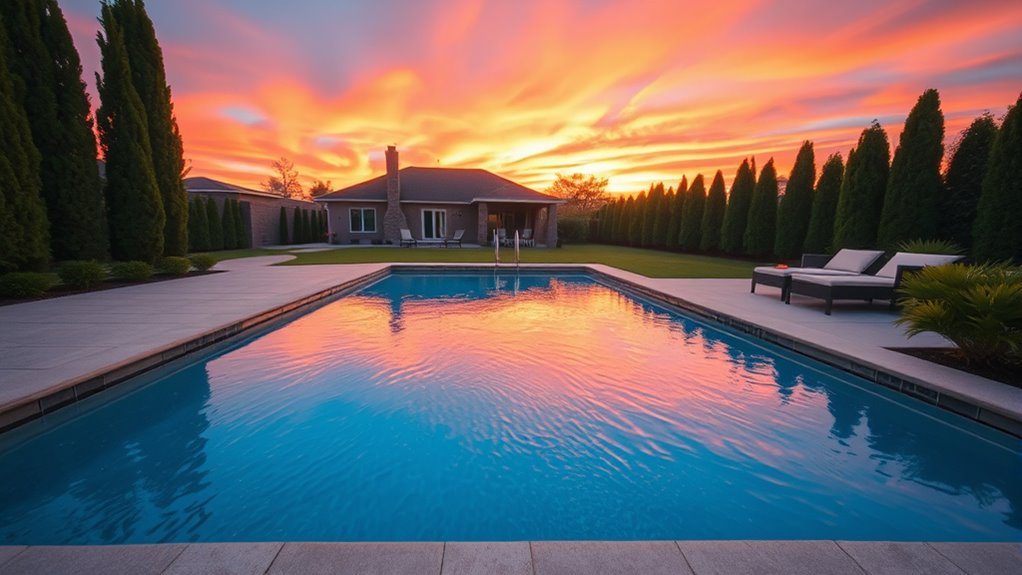
Owning a pool can substantially increase your home insurance costs because it introduces additional risks that insurers need to contemplate. Pools are considered a liability hazard since accidents or injuries can occur, making insurers more cautious. They often view pools as higher risk, which can lead to higher premiums to offset potential claims. The size, type, and location of your pool also influence costs—larger or in-ground pools usually cost more to insure. Additionally, if your pool lacks proper fencing or safety features, insurers might see it as more dangerous, potentially raising your premium further. Pool safety measures are increasingly factored into insurance assessments to reduce liability concerns. Moreover, some insurers evaluate the presence of home safety features to help mitigate risk, which can influence premium calculations. Keep in mind, some insurers may require specific coverage or exclusions related to pool-related damages or injuries, impacting your overall policy costs.
Safety Features and Liability Considerations
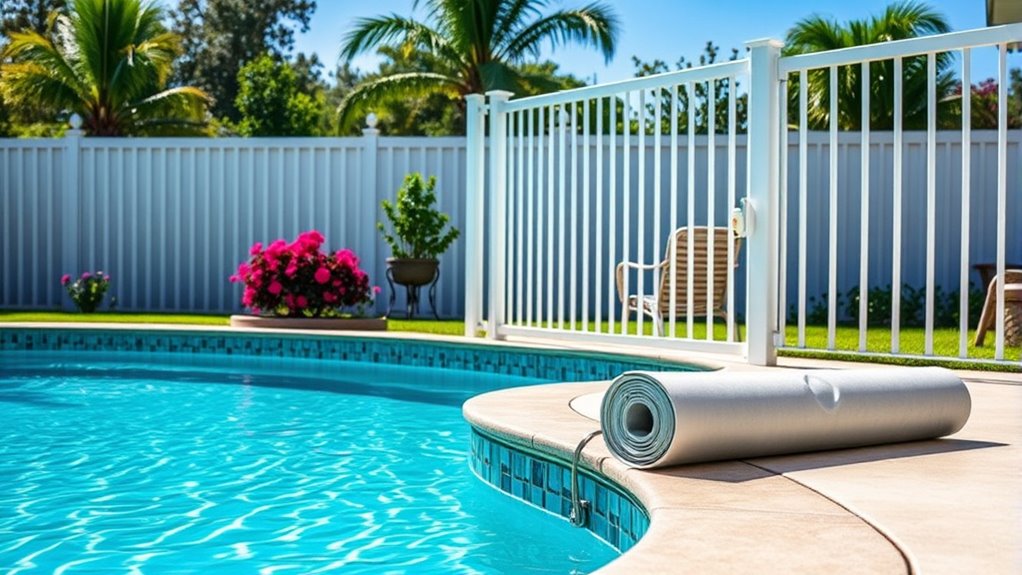
Installing safety features like fencing, pool covers, and alarms can considerably reduce liability risks and help control insurance costs. A secure fence around your pool limits accidental access, especially for children or trespassers, reducing potential lawsuits. Pool covers prevent debris and accidental falls when the pool isn’t in use, lowering safety hazards. Alarms that alert you when someone enters the water add an extra layer of security. These measures not only protect your family and guests but also demonstrate responsible ownership to your insurer. Implementing insurance risk mitigation strategies can further influence your premium rates positively. As a result, insurance companies view your property as less risky, which can lead to lower premiums. Prioritizing safety features shows your commitment to preventing accidents, ultimately benefiting both your peace of mind and your wallet. Additionally, implementing juice cleansing practices can promote overall wellness and support a healthier lifestyle, further contributing to your safety and well-being. Conducting a home safety assessment can help identify potential hazards and ensure your safety measures are comprehensive, especially considering how pool safety standards impact liability and costs.
Size and Location of the Pool
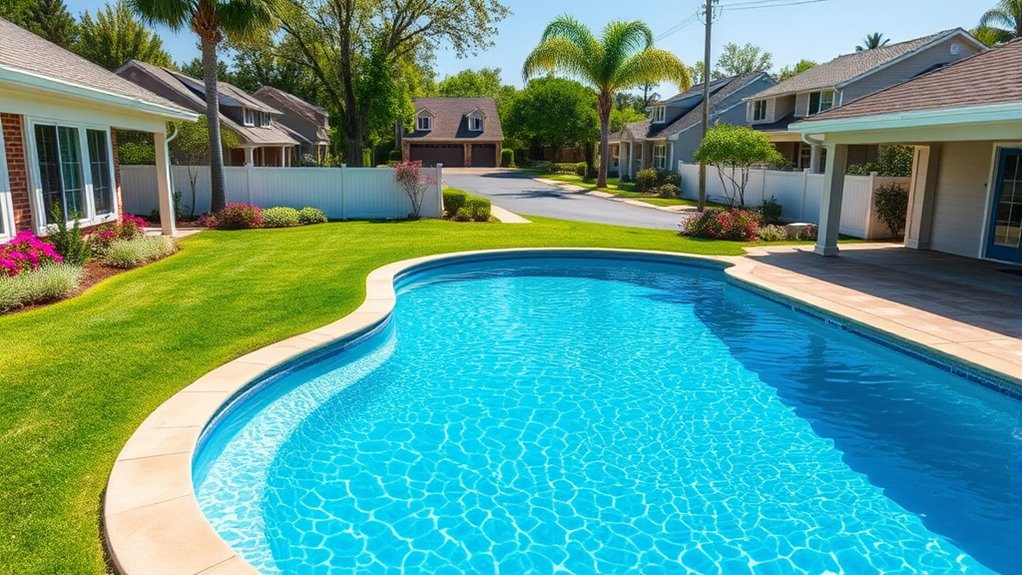
The size and location of your pool can substantially impact your insurance premiums and liability risks. A larger pool increases the potential for accidents, which may lead to higher liability coverage costs. If your pool is centrally located in your yard, it’s more accessible, raising the chance of someone accidentally entering or falling in. Conversely, placing the pool away from play areas or property lines can reduce the risk of injuries and damage. Additionally, a smaller, fenced-in pool is generally viewed as less risky by insurers. Properly positioning your pool to minimize hazards and ensure safety can help keep premiums in check. Safety considerations are a key factor that insurers evaluate when determining rates. Remember, insurers consider how the pool’s size and placement influence safety and potential claims when calculating your rates. Insurers may also evaluate the horsepower of electric dirt bikes used in your area, as high-powered bikes can be associated with increased safety concerns around pools. Using pool safety features such as alarms, covers, and fencing can further mitigate risks and positively influence your premium.
Additional Coverage and Policy Adjustments
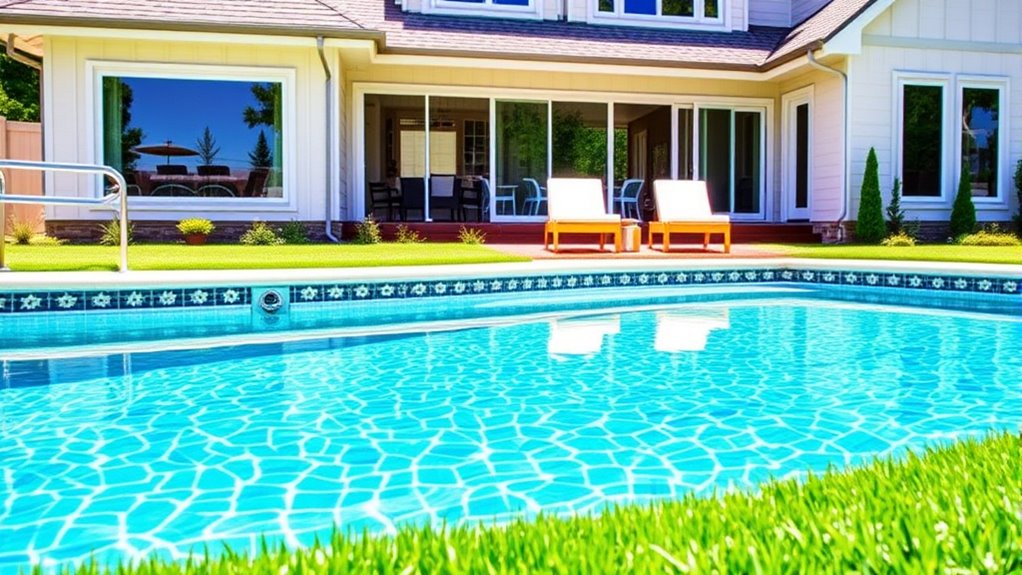
To guarantee you’re adequately protected, consider adding specific coverage options tailored to pool-related risks. Standard home insurance policies may not fully cover pool-related damages or accidents, so you might need to update your policy. For example, you can add liability coverage to protect against injuries or property damage caused by your pool. You could also include accidental pool damage coverage, which handles repairs from vandalism, storms, or other unforeseen events. Additionally, check if your policy covers pool equipment and accessories. Some insurers offer endorsements specifically designed for pools, giving you peace of mind without drastically increasing premiums. Reviewing your policy regularly to ensure it reflects any pool-related upgrades or changes can help prevent gaps in your coverage when you need it most. Understanding the history of pool safety regulations can also help inform your coverage choices and safety measures. Incorporating risk management strategies can further enhance your safety and reduce potential claims. Staying informed about safety standards can help you implement effective precautions and minimize liability. Being aware of insurance claim processes ensures you know how to handle incidents efficiently should they occur. Additionally, being aware of cost factors related to coverage adjustments can help you balance protection with affordability.
Tips for Managing Premiums With a Pool
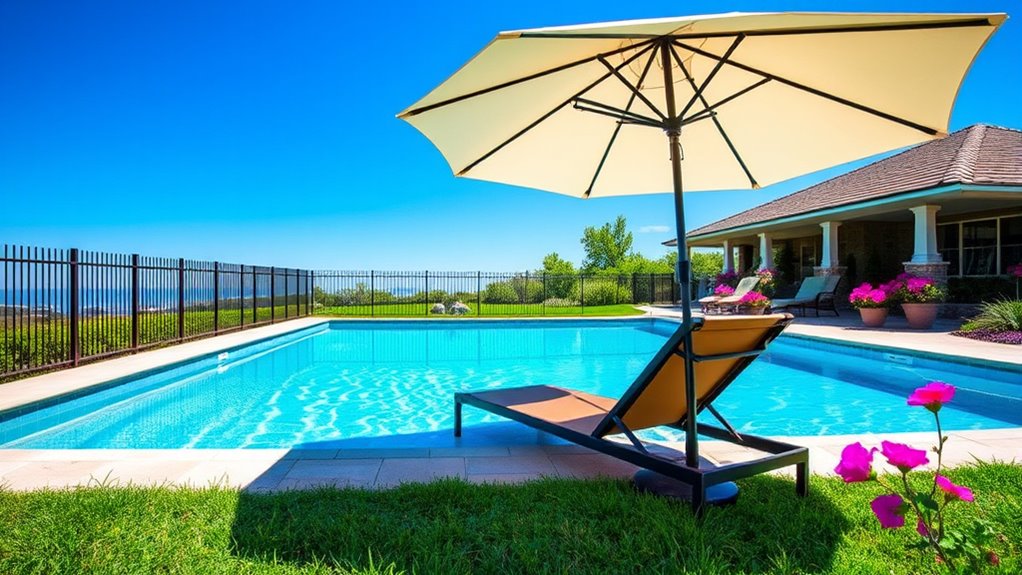
Managing your premiums effectively when you have a pool involves proactive steps to balance safety and cost. Start by installing proper safety features like fences, alarms, and covers to reduce risk and insurance costs. Implementing safety measures can significantly lower your premiums and protect your loved ones. Regular maintenance ensures your pool stays safe and minimizes damage claims. Obtain multiple quotes from insurers to find the best rate and ask about discounts for safety measures. Keep your claims history clean and avoid making small claims that could raise premiums. Educate your family about pool safety to prevent accidents. Staying informed about insurance policies related to pools can also help you make better coverage decisions. Additionally, understanding home insurance premiums and how they are calculated can empower you to negotiate better rates with your provider. Learning about risk assessment factors can further aid in managing your insurance costs effectively. Being aware of cookie preferences and how they influence your online interactions can also help you stay informed about your privacy and security online.
Frequently Asked Questions
The type of pool you have impacts your insurance premiums. In-ground pools typically cost more to insure because they’re more permanent, expensive, and pose higher safety risks. Above-ground pools are usually cheaper to insure, as they’re less costly and considered less risky. You should check with your insurer about specific rates, but generally, in-ground pools lead to higher premiums, while above-ground pools keep costs lower.
Are There Specific Insurance Providers That Offer Better Rates for Pool Owners?
Partner with providers who prioritize policies for pool owners. Many insurers specialize in securing savings for swimmers and sunbathers, offering better rates for pools. Shop around and compare quotes, looking for companies known for customer care and extensive coverage. Don’t hesitate to ask about discounts for safety features or pool alarms. By proactively aligning with the right insurer, you can pool profits and peace of mind without paying a premium.
Does Having a Pool Affect Home Appraisal Value?
Having a pool can boost your home’s appraisal value, especially if it’s well-maintained and adds appeal to your property. Buyers often see pools as a luxury feature, increasing desirability and market value. However, the impact varies based on your location and the pool’s condition. Keep in mind that while it can raise your appraisal, it might also lead to higher insurance costs and maintenance responsibilities.
How Does Seasonal Use of a Pool Impact Insurance Costs?
Seasonal use of your pool can influence your home insurance costs because insurers consider risk factors like increased liability during the months you use it most. If you only use the pool part of the year, you might see lower premiums compared to year-round use, but coverage may still include liability protection. Make sure to inform your insurer about your seasonal schedule to get accurate rates and proper coverage.
Can Installing Pool Safety Covers Reduce Insurance Premiums?
Imagine your pool as a floating fortress of fun, but insurance companies see it as a liability parade. Installing safety covers acts like a knight’s shield, reducing risks of accidents or drownings. This proactive move can lower your premiums, as insurers view your pool as safer. So, don’t just splash around—invest in a cover and turn your aquatic playground into a safer, more affordable paradise.
Conclusion
So, owning a pool might just make your premiums dip—if you ignore the added risks. Ironically, while you might think a pool’s luxury justifies higher costs, it’s often the safety features and smart coverage choices that keep your rates in check. Just remember, a splashy backyard can come with more than just fun—it can lead to unexpected expenses if you’re not careful. Plunge in wisely, and your wallet will thank you.





